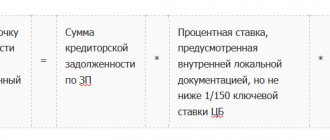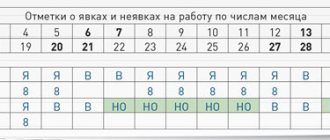Sometimes employers consider it necessary to pay their employees additional funds in addition to their salaries in order to reward them for good work or to compensate them in some way. The very name of the bonus indicates that it is not assigned to everyone, but only to specific employees based on certain indicators.
Let us clarify on what basis a personal allowance can be established, which categories of workers are not entitled to it at all, how to properly formalize it, and, if necessary, cancel it.
How to set a personal allowance for an employee ?
The essence of a personal allowance
An employee can receive not only a “bare” salary, but also additional payments, including those assigned in addition to wages.
The Labor Code does not have a precise definition of a bonus. The bonus included in the salary, reflected in the employment contract or additional agreement to it, is common to all personnel when certain conditions occur, for example, for work in certain climatic zones, for shift work, etc. Such bonuses are not considered personal.
If the employer is not obliged to assign a bonus, but he does it for individual employees on an individual basis, reflecting the conditions of the appointment in a special Regulation, collective agreement or other local act, such payment will be a personal bonus . The right to assign such payments by the employer is granted by Art. 135 Labor Code of the Russian Federation.
The feasibility of assigning personal allowances
In what cases may an employer need a personal allowance mechanism? When might it be necessary to make remuneration special for a specific employee or group of employees? The following options are possible:
- the employer wants to highlight the successes of a particular employee;
- there is a desire to reward an employee for having outstanding or unique knowledge and skills;
- It is undesirable to change the existing system of rates and salaries, but at the same time there is a need for additional incentives for workers.
Question: When calculating vacation pay, should I take into account the bonus paid to the employee by March 8, the personal bonus to the salary and the one-time charge for mentoring? View answer
Different types of personal allowances
The type of allowance can be determined by various factors:
- Basis for accrual - the employer has the right to assign a personal allowance:
- for experience;
- for skill level;
- for a certain intensity of work;
- for professional excellence;
- for performing tasks of special importance and/or urgency;
- for “bonus” skills and abilities, for example, knowledge of a foreign language;
- for an academic degree in a specialized field;
- for work under conditions of official secrecy, etc.
- Duration of validity of the provisions on the allowance - these payments can be established either permanently or temporarily:
- for a month;
- per quarter;
- for a year;
- indefinitely.
- The amount of the premium can be determined in different ways:
- a fixed amount is fixed in local documents;
- the amount of the bonus is calculated in a certain way, for example, as a percentage of the salary or average salary;
- determination of the size by the labor participation rate: the monthly amount allocated for allowances will be distributed differently within the group of workers.
NOTE! Despite the fact that the amount for personal allowances is not limited by law, they should not be set in an amount exceeding the monthly salary. Large premiums are difficult to justify in court in the event of any disputes; there is a high probability that they will be recognized as part of mandatory payments. Practice shows that the maximum amount of a personal bonus should not be more than 50% of the salary, and the optimal amount is 10-20%.
Documentation that sets out the payment procedure
Sometimes employers consider it necessary to pay their employees additional funds in addition to their salaries in order to reward them for good work or to compensate them in some way. The very name of the bonus indicates that it is not assigned to everyone, but only to specific employees based on certain indicators.
Let us clarify on what basis a personal allowance can be established, which categories of workers are not entitled to it at all, how to properly formalize it, and, if necessary, cancel it.
An employee can receive not only a “bare” salary, but also additional payments, including those assigned in addition to wages.
The Labor Code does not have a precise definition of a bonus.
The bonus included in the salary, reflected in the employment contract or additional agreement to it, is common to all personnel when certain conditions occur, for example, for work in certain climatic zones, for shift work, etc. Such bonuses are not considered personal.
If the employer is not obliged to assign a bonus, but he does it for individual employees on an individual basis, reflecting the conditions of appointment in a special Regulation, collective agreement or other local act, such a payment will be a personal bonus. The right to assign such payments by the employer is granted by Art. 135 Labor Code of the Russian Federation.
In what cases may an employer need a personal allowance mechanism? When might it be necessary to make remuneration special for a specific employee or group of employees? The following options are possible:
- the employer wants to highlight the successes of a particular employee;
- there is a desire to reward an employee for having outstanding or unique knowledge and skills;
- It is undesirable to change the existing system of rates and salaries, but at the same time there is a need for additional incentives for workers.
The type of allowance can be determined by various factors:
- Basis for accrual - the employer has the right to assign a personal allowance:
- for experience;
- for skill level;
- for a certain intensity of work;
- for professional excellence;
- for performing tasks of special importance and/or urgency;
- for “bonus” skills and abilities, for example, knowledge of a foreign language;
- for an academic degree in a specialized field;
- for work under conditions of official secrecy, etc.
- Duration of validity of the provisions on the allowance - these payments can be established either permanently or temporarily:
- for a month;
- per quarter;
- for a year;
- indefinitely.
- The amount of the premium can be determined in different ways:
- a fixed amount is fixed in local documents;
- the amount of the bonus is calculated in a certain way, for example, as a percentage of the salary or average salary;
- determination of the size by the labor participation rate: the monthly amount allocated for allowances will be distributed differently within the group of workers.
NOTE! Despite the fact that the amount for personal allowances is not limited by law, they should not be set in an amount exceeding the monthly salary.
Large premiums are difficult to justify in court in the event of any disputes; there is a high probability that they will be recognized as part of mandatory payments.
Practice shows that the maximum amount of a personal bonus should not be more than 50% of the salary, and the optimal amount is 10-20%.
Additional personal benefits can be assigned to any full-time employee of the organization, since they are added to his salary, often calculated as a percentage of his salary. At the same time, the registration of an employee on the staff does not have much significance; the following may qualify for a personal allowance:
- an employee who has entered into a regular employment contract;
- "conscript";
- part-time worker.
The employer is not obliged to include the terms of the personal bonus in the employment contract, since this is an incentive payment.
But since this is still part of the remuneration, it must be documented.
To do this, you need to regulate the personal bonus in a collective agreement or in the Regulations on remuneration and be sure to refer to this document in the text of the employment agreement (Article 57 of the Labor Code of the Russian Federation).
IMPORTANT! If the employer does not include provisions on the bonus in local documents, paying it without registration, he is not threatened with legislative liability. The only thing that can serve as a disadvantage for the employer in such a situation is that unreasonable payments cannot be attributed to expenses that reduce the tax base.
How else can you arrange the payment of a personal allowance, if not through a separate document? This may be necessary when the nature of the payments is not systematic, but one-time or calculated for a certain period.
In this case, it is advisable to draw up a memo (petition) from immediate management to a higher one who has the authority to assign a bonus. This could be the general director, financial director, head of the personnel department, chief accountant, etc.
In the text of the note, in addition to the mandatory details of business documents, you should indicate:
- arguments justifying the assignment of a bonus to a specific employee or their group;
- the expected amount of additional payment;
- at what expense is the premium supposed to be assigned (for example, from the wage fund or by increasing profits from sales, etc.);
- validity period of additional payments.
ATTENTION! It is not customary to formalize permanent allowances using memos. After the expiration of the specified period, you can again apply for a supplement. With this kind of document you can request the appointment, increase, decrease, extension or cancellation of a personal payment.
The compiled memo, signed by management, will become the basis for preparing an order for the calculation of the allowance. The execution of this order can be in any form.
It is important to correctly motivate the appointment of additional payments, since their feasibility from a production or economic point of view is a guarantee that these costs are included in the cost of production, which is very strictly checked by tax authorities.
After issuing an order to assign an allowance, the employee must be familiar with it, which is confirmed by a personal visa (this procedure is common for any orders).
Like setting, canceling or changing a personal allowance occurs by order of management.
ATTENTION! The employer is not obliged to inform staff about the reasons for assigning personal allowances and their amounts, but if he plans to stop these payments, it is better to warn about this in advance.
It is important to regulate all financial issues correctly and take into account all legislative subtleties. When assigning personal increases, the employer must take into account certain circumstances:
- A correctly executed personal allowance in accounting is treated as “labor expenses”.
- The bonus is calculated simultaneously with the salary.
- This payment is included in the calculation of average earnings necessary for calculating, for example, vacation pay (Resolution of the Government of the Russian Federation No. 922 of December 24, 2007, as amended on October 15, 2014).
- If the deadline specified in the bonus regulations is violated, when the payment is unreasonably and unexpectedly terminated earlier for the employee, the employee has the right to demand additional accrual of the bonus and payment of late fees.
- If the head of a structural unit does not send a memo on time, personal payments will be stopped, because this document is the basis for issuing an order to accrue funds.
- If an employee receiving a personal allowance is transferred to another position, the right to the allowance is not retained unless it is provided for by the provisions of the new position.
- A change in the leadership of an organization may lead to changes in the provisions on personal allowances.
- A personal allowance must be reflected in the staffing table, indicating the numbers of orders for its accrual.
There is no such concept as a personal allowance in legislative acts, but a conclusion about its legality can be drawn from Article 135 of the Labor Code of the Russian Federation, which allows employers to establish any allowances and additional payments to their employees.
Personal allowances to the basic salary may be provided for in the following documents:
- local regulatory documents governing the calculation of wages and bonuses;
- the employment contract of a specific employee.
In local regulations, as a rule, allowances are prescribed without reference to a specific person. They are established for specific work or merit. If a personal allowance is specified in the employment contract of a particular employee, then it applies only to him.
Personal allowances are used to achieve the following goals:
- payment to an employee for performing tasks not related to the job description;
- motivation and encouragement of individual employees.
Personal allowances can be either permanent or one-time. That is, they can be paid constantly, or accrued only in the month when the employee performs additional work.
All these nuances must be specified in the order by which the employee is assigned a personal allowance.
The order on personal allowance establishes it for a specific employee. It must be issued even if the bonus is specified in the employment contract.
This is necessary so that the accounting department has grounds for calculating an allowance, since an employment contract is a document containing personal data, and therefore a limited number of persons have access to it.
The order is drawn up in any form, on the organization’s letterhead. It must contain the following details:
- Date and order number;
- Full name of the employee to whom the bonus is set;
- Type and size of the allowance;
- The procedure for its calculation;
- The period for which it is established;
- Document on the basis on which it is calculated;
- Manager's signature;
- Signature of the employee confirming familiarization with the order.
You can also draw up an order on a unified T-11 or T-11a form, especially if the orders are drawn up in a specialized personnel or accounting program.
Such an order only needs to be kept for 5 years, but in practice it is better to keep it until a tax audit is carried out to prove the validity of attributing these amounts to salary expenses. And if the bonus is permanently established for the employee, then a copy of the order can be placed in his personal file.
- Collective agreement;
- Regulations on remuneration;
- Regulations on bonus payments to employees;
- Employment contract (may contain a reference to a collective agreement);
- Staffing table;
- Order from the manager (if the payment is a one-time payment and not permanent).
Who gets a personal allowance and who doesn’t?
Additional personal benefits can be assigned to any full-time employee of the organization, since they are added to his salary, often calculated as a percentage of his salary. At the same time, the registration of an employee on the staff does not have much significance; the following may qualify for a personal allowance:
- an employee who has entered into a regular employment contract;
- "conscript";
- part-time worker.
It is not customary to assign personal bonus payments to the following categories of workers:
- freelancers;
- workers working under a contract;
- who have concluded civil contracts.
Who can count on bonuses and additional payments?
Not all categories of workers can count on the establishment of bonuses and additional payments.
These payments are not eligible:
- For those who work under a civil contract;
- Workers under a contract;
- Those with whom an agency agreement has been concluded.
This is explained by the fact that legal relations with such persons are regulated by the Civil Code, and not the Labor Code.
Those citizens who are hired on the basis of employment contracts, even those concluded for a certain period or who are part-time workers, have the right to receive all the specified monetary payments.
Registration of a personal allowance
IMPORTANT! A sample order for establishing a personal allowance from ConsultantPlus is available here
The employer is not obliged to include the terms of the personal bonus in the employment contract, since this is an incentive payment. But since this is still part of the remuneration, it must be documented.
To do this, you need to regulate the personal bonus in a collective agreement or in the Regulations on remuneration and be sure to refer to this document in the text of the employment agreement (Article 57 of the Labor Code of the Russian Federation).
IMPORTANT! If the employer does not include provisions on the bonus in local documents, paying it without registration, he is not threatened with legislative liability. The only thing that can serve as a disadvantage for the employer in such a situation is that unreasonable payments cannot be attributed to expenses that reduce the tax base.
Petition and order for personal allowance
How else can you arrange the payment of a personal allowance, if not through a separate document? This may be necessary when the nature of the payments is not systematic, but one-time or calculated for a certain period. In this case, it is advisable to draw up a memo (petition) from immediate management to a higher one who has the authority to assign a bonus. This could be the general director, financial director, head of the personnel department, chief accountant, etc. In the text of the note, in addition to the mandatory details of business documents, you should indicate:
- arguments justifying the assignment of a bonus to a specific employee or their group;
- the expected amount of additional payment;
- at what expense is the premium supposed to be assigned (for example, from the wage fund or by increasing profits from sales, etc.);
- validity period of additional payments.
ATTENTION! It is not customary to formalize permanent allowances using memos. After the expiration of the specified period, you can again apply for a supplement. With this kind of document you can request the appointment, increase, decrease, extension or cancellation of a personal payment.
The compiled memo, signed by management, will become the basis for preparing an order for the calculation of the allowance. The execution of this order can be in any form. It is important to correctly motivate the appointment of additional payments, since their feasibility from a production or economic point of view is a guarantee that these costs are included in the cost of production, which is very strictly checked by tax authorities.
After issuing an order to assign an allowance, the employee must be familiar with it, which is confirmed by a personal visa (this procedure is common for any orders).
Order on salary increase
According to Art. 57 of the Labor Code of the Russian Federation , additional payments, allowances and incentive payments must be specified in the employment contract with the employee when hiring him.
When changing the amount of allowances, additional payments, bonuses, an additional agreement must be concluded with the employee about the upcoming event.
You can find a sample form of an additional agreement on changing the amount of the premium here for free.
In addition, this fact is also confirmed by an order from management. Labor legislation does not stipulate the exact and correct drafting of orders. There are no exact requirements and range of issues that need to be reflected in it. The form is still free today.
Download a sample order for a salary increase here.
Important nuances of personal increases
It is important to regulate all financial issues correctly and take into account all legislative subtleties. When assigning personal increases, the employer must take into account certain circumstances:
- A correctly executed personal allowance in accounting is treated as “labor expenses”.
- The bonus is calculated simultaneously with the salary.
- This payment is included in the calculation of average earnings necessary for calculating, for example, vacation pay (Resolution of the Government of the Russian Federation No. 922 of December 24, 2007, as amended on October 15, 2014).
- If the deadline specified in the bonus regulations is violated, when the payment is unreasonably and unexpectedly terminated earlier for the employee, the employee has the right to demand additional accrual of the bonus and payment of late fees.
- If the head of a structural unit does not send a memo on time, personal payments will be stopped, because this document is the basis for issuing an order to accrue funds.
- If an employee receiving a personal allowance is transferred to another position, the right to the allowance is not retained unless it is provided for by the provisions of the new position.
- A change in the leadership of an organization may lead to changes in the provisions on personal allowances.
- A personal allowance must be reflected in the staffing table, indicating the numbers of orders for its accrual.








